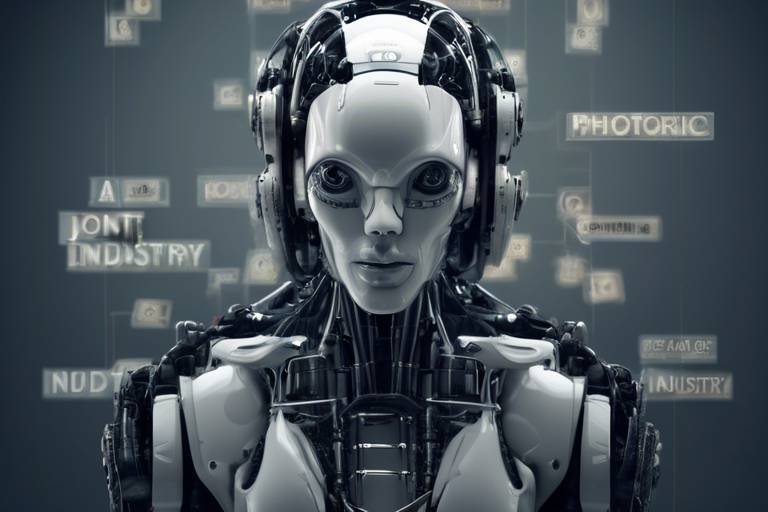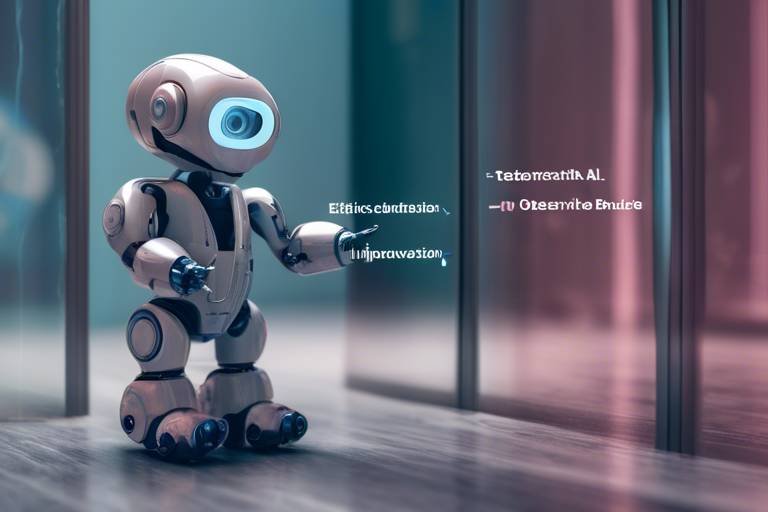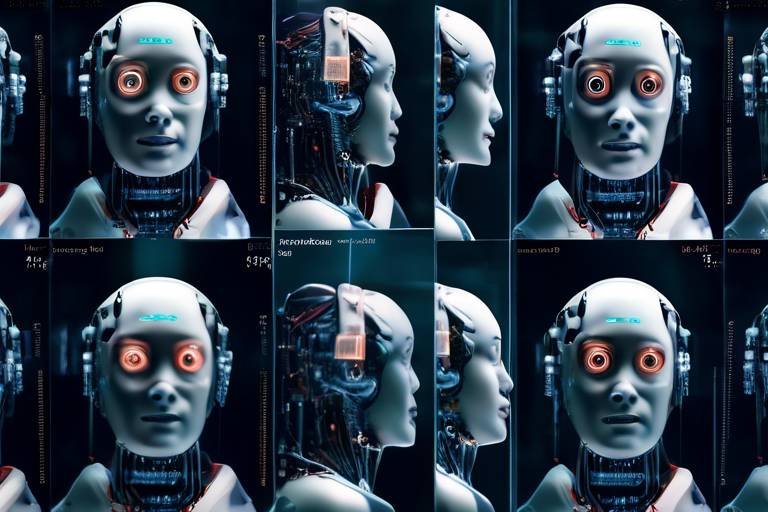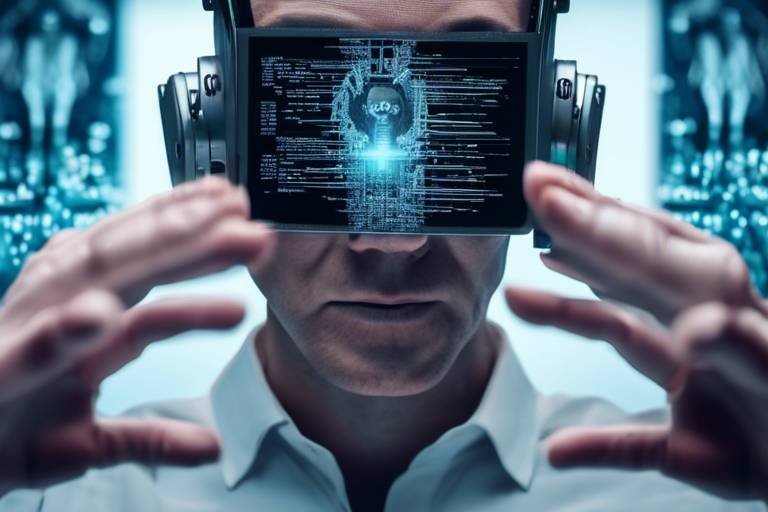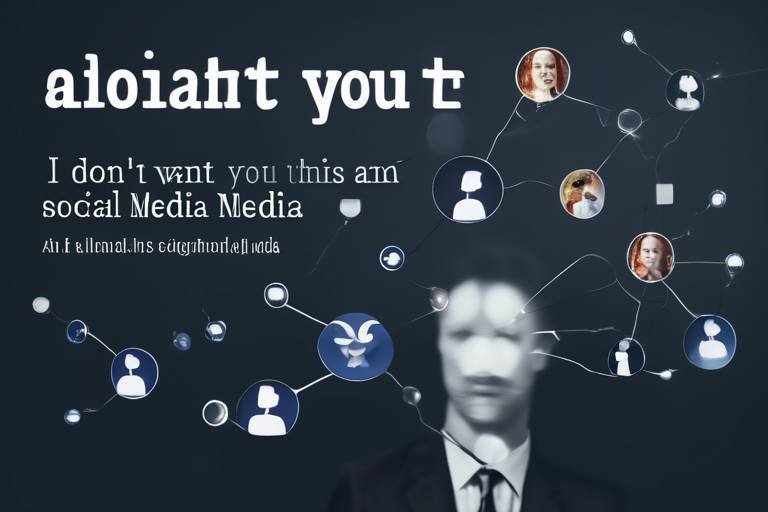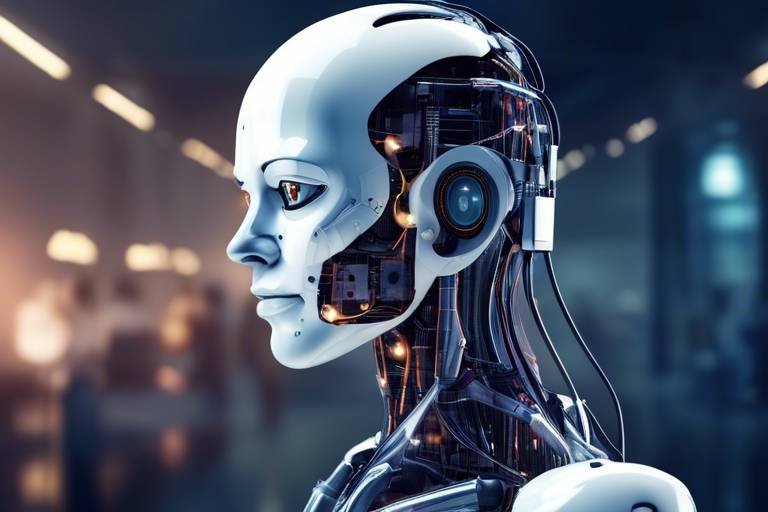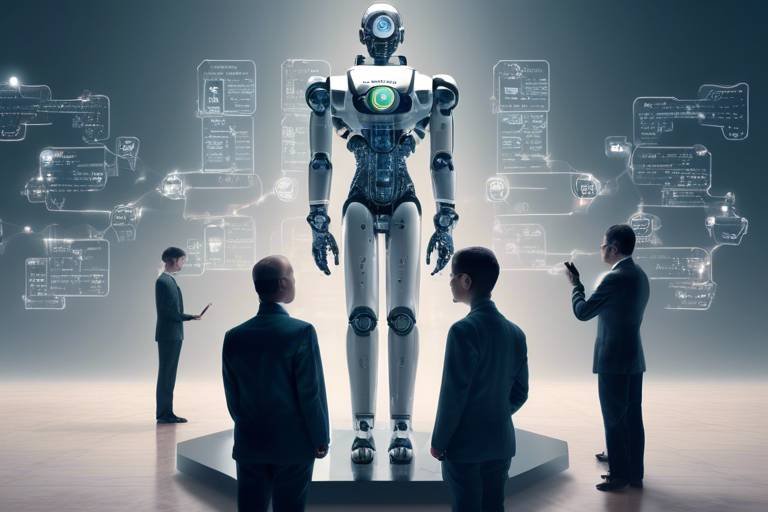Protecting Human Rights within AI Ethics
In our rapidly evolving digital age, the intersection of artificial intelligence (AI) and human rights has become a topic of critical importance. As AI technologies permeate every aspect of our lives, from healthcare to finance, the ethical implications surrounding their use cannot be overlooked. The core question we must grapple with is: how do we ensure that these powerful tools respect and uphold individual freedoms? This article explores the intricate relationship between AI and human rights, emphasizing the ethical considerations that must guide the development and deployment of AI systems.
To begin, it’s essential to understand that AI ethics is not just a technical concern; it is fundamentally about people. The decisions made by AI systems can significantly affect our lives, shaping everything from job opportunities to personal privacy. As such, integrating human rights into AI ethics frameworks is not merely an option but a necessity. By prioritizing human dignity and freedom, we can create technologies that empower individuals rather than diminish their rights.
As we dive deeper into this topic, we must acknowledge that the potential risks associated with AI are significant. From privacy violations to systemic discrimination, the ramifications of unchecked AI deployment can be dire. For instance, consider how facial recognition technology has been misused in various contexts, leading to wrongful arrests and racial profiling. These examples serve as stark reminders that, without robust ethical guidelines, AI can become a tool of oppression rather than liberation.
Moreover, the collection and analysis of personal data by AI systems raise profound privacy concerns. In a world where our every move can be tracked and analyzed, how do we maintain our right to privacy? The balance between innovation and individual rights is delicate, and it requires careful consideration. We must ask ourselves: at what cost do we pursue technological advancements? Ensuring that AI respects the right to privacy is paramount, and it requires a concerted effort from developers, policymakers, and society at large.
Another pressing issue is the potential for AI systems to perpetuate existing biases, which can lead to discrimination against marginalized groups. As we examine the sources of bias in AI, it becomes clear that the data used to train these systems often reflect societal inequalities. Without intervention, AI can inadvertently reinforce stereotypes and exacerbate disparities. Thus, it is crucial to implement strategies that not only identify and mitigate bias but also promote inclusivity in AI development.
In response to these challenges, various ethical frameworks have emerged to guide the responsible development of AI. These frameworks emphasize the importance of transparency, accountability, and respect for human rights. By adhering to established guidelines, developers can create AI systems that align with ethical principles and contribute positively to society. However, the implementation of these frameworks is not without its hurdles, and ongoing dialogue among stakeholders is essential to ensure their effectiveness.
As governments and organizations worldwide recognize the impact of AI on human rights, regulatory approaches are being developed to address these issues. Current legislative efforts aim to create a balance between fostering innovation and protecting individual rights. However, the effectiveness of these regulations is still under scrutiny, and it is vital to assess their real-world implications.
International human rights standards play a crucial role in shaping AI ethics. Global agreements influence national policies and practices, providing a framework for countries to follow. Yet, the challenge lies in harmonizing these diverse legal frameworks to create a cohesive approach to AI regulation. As nations craft their own regulations, it is essential to consider the broader implications for human rights and ensure that these laws uphold the dignity and freedoms of all individuals.
In conclusion, protecting human rights within the realm of AI ethics is not just a theoretical exercise; it is a pressing necessity. As we navigate the complexities of AI technology, we must remain vigilant in our commitment to uphold individual freedoms and dignity. By fostering a culture of ethical AI development, we can harness the power of technology to create a more just and equitable society.
- What is AI ethics? AI ethics refers to the moral principles guiding the development and use of artificial intelligence technologies.
- How can AI impact human rights? AI can impact human rights through privacy violations, discrimination, and the potential misuse of personal data.
- Why are privacy concerns important in AI? Privacy concerns are crucial because AI systems often collect and analyze vast amounts of personal data, raising questions about consent and individual rights.
- What can be done to mitigate bias in AI? To mitigate bias, developers can use diverse datasets, implement fairness algorithms, and continuously monitor AI systems for discriminatory outcomes.
- Are there regulations for AI technologies? Yes, various governments and organizations are developing regulations to address the impact of AI on human rights, although these efforts vary widely across countries.

Understanding AI Ethics
When we talk about AI ethics, we're diving into a pool of moral principles that guide how artificial intelligence is developed and deployed in our society. Imagine AI as a powerful tool—like a double-edged sword—that can either uplift humanity or cause significant harm, depending on how it’s wielded. At the heart of AI ethics is the need for a framework that not only promotes innovation but also safeguards our fundamental rights as individuals. This is crucial because, as AI technologies become more integrated into our daily lives, their impact on society grows exponentially.
To grasp the essence of AI ethics, we must consider several key concepts. First off, transparency is vital. We need to know how AI systems make decisions, especially when those decisions affect our lives. If an AI denies you a loan or a job, wouldn’t you want to know why? Transparency builds trust and ensures that individuals can hold AI systems accountable. Next, we have fairness. This involves ensuring that AI systems do not perpetuate existing biases or create new forms of discrimination. After all, nobody wants to live in a world where algorithms decide who gets what based on flawed data or prejudiced programming.
Moreover, the concept of accountability cannot be overlooked. Who is responsible when an AI system goes awry? Is it the developers, the companies, or perhaps the users? Establishing clear lines of accountability is essential to foster responsible AI usage. Lastly, we cannot forget about privacy. In an age where data is the new oil, protecting our personal information from misuse is paramount. AI systems often rely on vast amounts of data to function effectively, but this raises questions about consent and the ethical use of personal information.
Incorporating human rights into AI systems isn’t just a nice-to-have; it’s a necessity. We need to ensure that as we advance technologically, we do not sacrifice our dignity and freedoms. This means actively working towards creating AI that respects and enhances our human rights. The challenge lies in balancing the drive for innovation with the need for ethical considerations. As we move forward, it’s crucial to engage in discussions about these topics, ensuring that a diverse range of voices are heard, especially those from marginalized communities who are often disproportionately affected by AI technologies.
To summarize, the understanding of AI ethics is multifaceted, encompassing transparency, fairness, accountability, and privacy. As we continue to integrate AI into various sectors—from healthcare to finance—recognizing the ethical implications is essential for creating a future where technology serves humanity rather than undermines it. It’s about building an AI landscape that not only meets our needs but also respects our rights and freedoms.

The Importance of Human Rights in AI
In today's rapidly evolving technological landscape, the significance of human rights in artificial intelligence (AI) cannot be overstated. As we stand on the brink of a new era defined by AI advancements, it's crucial to recognize that these technologies hold the power to either enhance or undermine our fundamental freedoms. Imagine a world where AI systems dictate the terms of our existence, influencing everything from job opportunities to personal privacy. This is not just a futuristic scenario; it's a reality we must confront today.
At the heart of ethical AI lies the principle of human dignity. This principle emphasizes that every individual deserves respect, autonomy, and the right to make choices about their own lives. When AI systems are designed without considering human rights, they can inadvertently strip away these essential elements, leading to a society where individuals are treated as mere data points rather than as human beings. For instance, consider facial recognition technology, which has been criticized for its potential to violate privacy and disproportionately target marginalized communities. Such applications raise critical questions: How do we ensure that AI technologies serve humanity rather than harm it?
Moreover, the integration of human rights into AI development is not merely a moral obligation; it is a strategic necessity. Companies that prioritize ethical considerations in their AI practices can build trust with their users, fostering a positive relationship that enhances brand loyalty. In contrast, organizations that neglect these principles risk facing public backlash, legal challenges, and reputational damage. Just like a sturdy building requires a solid foundation, ethical AI requires a commitment to human rights as its base.
Furthermore, the impact of AI on fundamental rights extends beyond individual experiences; it has broader societal implications. For example, AI-driven decision-making in areas such as criminal justice, hiring, and healthcare can perpetuate systemic inequalities if not carefully monitored. To illustrate this point, consider the following table that highlights some key human rights and their relevance in the context of AI:
| Human Right | Relevance to AI |
|---|---|
| Right to Privacy | AI systems often collect vast amounts of personal data, posing risks to individual privacy. |
| Right to Non-Discrimination | AI can perpetuate biases, leading to unfair treatment of certain groups. |
| Right to Freedom of Expression | AI censorship can limit free speech and access to information. |
| Right to a Fair Trial | AI in legal systems must be transparent to ensure justice is served fairly. |
In summary, recognizing the importance of human rights in AI is not just an ethical consideration; it is a crucial step towards ensuring that technology serves humanity rather than undermining it. As we navigate this complex landscape, we must advocate for a future where AI is developed and deployed with a steadfast commitment to upholding human dignity and individual freedoms. The stakes are high, and the choices we make today will shape the world of tomorrow.
- What are the main human rights concerns related to AI? Privacy violations, discrimination, and censorship are among the primary concerns.
- How can companies ensure their AI systems respect human rights? By implementing ethical guidelines and conducting regular audits to assess the impact of their technologies.
- What role do governments play in regulating AI? Governments can establish legal frameworks that promote ethical AI practices and protect individual rights.

Potential Risks of AI
As we dive deeper into the world of artificial intelligence, it's crucial to recognize that with great power comes great responsibility. While AI has the potential to revolutionize industries and improve our daily lives, it also brings a host of potential risks that can significantly impact human rights. These risks can manifest in various forms, including privacy violations, discrimination, and even the erosion of individual freedoms. Understanding these challenges is essential for developing AI systems that respect and uphold human rights.
One of the most pressing concerns surrounding AI technologies is the issue of privacy violations. As AI systems increasingly rely on vast amounts of personal data to function effectively, the line between innovation and intrusion becomes blurred. For instance, consider how social media platforms utilize AI algorithms to analyze user behavior. While this can enhance user experience, it also raises questions about consent and the extent to which individuals are aware of how their data is being used. In many cases, people may unknowingly give up their privacy, leading to a society where surveillance becomes the norm rather than the exception.
Another significant risk associated with AI is the potential for discrimination and bias. AI systems learn from historical data, which can inadvertently carry forward existing societal biases. For example, if an AI model is trained on data that reflects racial or gender biases, it may perpetuate these biases in its decision-making processes. This can have dire consequences, especially when AI is used in critical areas such as hiring, law enforcement, and lending. The implications of biased AI can lead to marginalized groups facing systemic discrimination, further widening societal inequalities.
To illustrate the potential risks of AI, consider the following examples:
- Facial Recognition Technology: Studies have shown that facial recognition systems are often less accurate for individuals with darker skin tones, leading to higher rates of false positives and wrongful accusations.
- Predictive Policing: AI-driven policing tools may target specific communities based on historical crime data, reinforcing existing biases and leading to over-policing of marginalized neighborhoods.
- Hiring Algorithms: AI systems used in recruitment may favor candidates based on biased historical data, disadvantaging qualified individuals from underrepresented groups.
These examples underscore the urgent need for ethical considerations in AI development. As we continue to integrate AI into various aspects of our lives, we must remain vigilant about its potential to infringe upon human rights. The challenge lies in finding a balance between leveraging the capabilities of AI for societal benefit while ensuring that we do not compromise individual freedoms and dignity in the process.
In conclusion, the potential risks of AI are multifaceted and complex. From privacy concerns to discrimination, the implications of these technologies can have far-reaching effects on society. It is imperative that we engage in ongoing discussions about the ethical use of AI and work collaboratively to develop frameworks that prioritize human rights, ensuring that technology serves as a force for good rather than a tool for oppression.
- What are the main risks associated with AI? The primary risks include privacy violations, discrimination, and bias in decision-making processes.
- How can we mitigate the risks of AI? Implementing ethical frameworks, conducting regular audits, and ensuring diverse data sets can help mitigate these risks.
- Why is it important to consider human rights in AI? Human rights considerations ensure that technological advancements do not infringe upon individual freedoms and dignity.

Privacy Concerns
In today's digital age, the collection and analysis of personal data by artificial intelligence systems have become not only commonplace but also a source of significant concern. As AI technologies continue to evolve, they are able to gather vast amounts of information about individuals, often without their explicit consent. This raises a crucial question: how much of our personal information are we willing to sacrifice for the sake of innovation? The tension between technological advancement and the right to privacy is palpable, and it's a conversation that we must engage in.
Consider this: every time you use a smartphone app, browse the web, or interact with a smart device, you're potentially leaving behind a digital footprint. This footprint can be analyzed and used to create detailed profiles of your behavior, preferences, and even your thoughts. While this data can enhance user experiences, it also opens the door to misuse. For instance, AI can be employed to manipulate information, target vulnerable populations with tailored advertisements, or even surveil individuals without their knowledge. Such practices not only infringe upon personal privacy but can also lead to broader societal implications.
Moreover, the balance between innovation and privacy is a delicate one. On one hand, AI systems can facilitate groundbreaking advancements in healthcare, finance, and various sectors that rely on data-driven insights. On the other hand, the potential for abuse is ever-present. A recent study highlighted that nearly 70% of individuals express concern about how their data is used by AI technologies. This sentiment underscores the necessity for robust privacy protections. To illustrate the impact of privacy violations, consider the following table:
| Incident | Impact on Privacy | Consequences |
|---|---|---|
| Data Breaches | Unauthorized access to personal data | Identity theft, financial loss |
| Surveillance Systems | Monitoring without consent | Chilling effect on free expression |
| Targeted Advertising | Manipulation of consumer choices | Loss of autonomy and informed decision-making |
As we navigate this complex landscape, it’s essential to advocate for stronger regulations that ensure AI developers prioritize privacy. This includes implementing transparent data collection practices, obtaining informed consent, and allowing individuals to control their own data. After all, privacy is not just a luxury; it's a fundamental human right that must be protected as we embrace the future of technology.
In conclusion, addressing privacy concerns in the context of AI is not merely about limiting data collection; it’s about fostering a culture of respect for individual rights. By prioritizing privacy, we can create a future where technology serves humanity rather than undermines it.
- What are the main privacy concerns related to AI? Privacy concerns include unauthorized data collection, surveillance without consent, and the potential misuse of personal information.
- How can individuals protect their privacy in an AI-driven world? Individuals can protect their privacy by being cautious about the information they share, using privacy settings on apps, and advocating for stronger data protection laws.
- What role do governments play in regulating AI privacy? Governments can create and enforce regulations that protect individual privacy rights, ensuring that AI technologies operate within ethical boundaries.
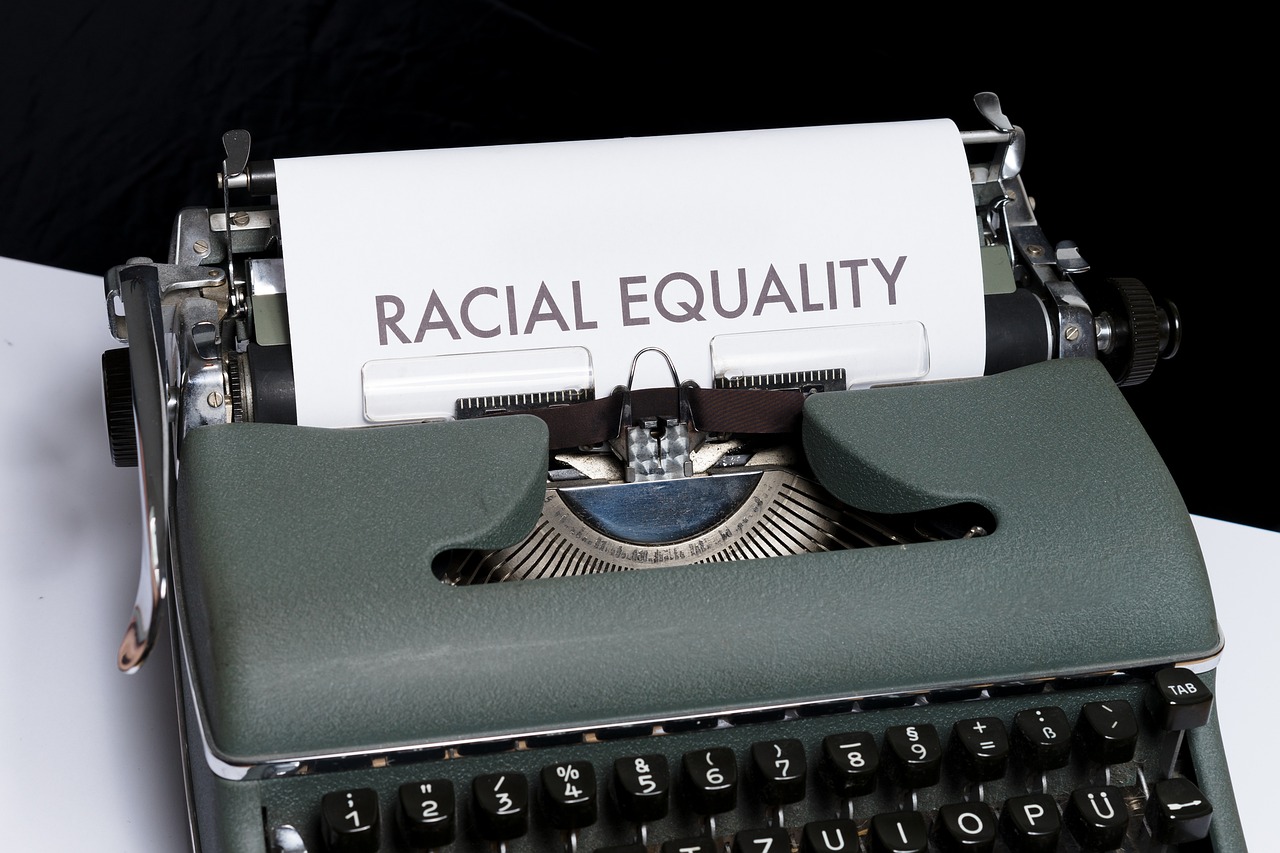
Discrimination and Bias
Artificial Intelligence (AI) is often touted as a revolutionary technology that can streamline processes and enhance decision-making. However, lurking beneath its shiny surface are significant concerns regarding discrimination and bias. These issues arise when AI systems, which are designed to learn from vast amounts of data, inadvertently perpetuate existing societal inequalities. Imagine a world where your chances of getting a job or receiving a loan depend not on your qualifications or financial stability, but rather on flawed algorithms that misinterpret your background based on biased data. This is not just a hypothetical scenario; it’s a reality for many marginalized groups today.
The crux of the problem lies in the data that feeds these AI systems. If the data used to train AI models reflects historical prejudices, the algorithms will likely replicate those biases. For instance, a hiring algorithm trained on data from a company with a history of gender discrimination may favor male candidates over equally qualified female candidates. This not only undermines the principles of fairness and equality but also limits opportunities for countless individuals. In a society that prides itself on diversity and inclusion, how can we allow technology to reinforce outdated stereotypes?
Moreover, the implications of biased AI extend far beyond individual cases. They can affect entire communities, leading to systemic discrimination in areas such as law enforcement, healthcare, and financial services. For example, AI systems used in predictive policing may disproportionately target minority neighborhoods based on historical crime data, further entrenching cycles of disadvantage. Similarly, AI-driven healthcare algorithms might underdiagnose conditions in certain demographic groups due to a lack of representation in the training data.
To combat these issues, it is essential to adopt a multi-faceted approach that includes:
- Diverse Data Collection: Ensuring that the datasets used to train AI systems are representative of all demographics, thus minimizing the risk of bias.
- Regular Audits: Implementing routine checks on AI algorithms to identify and rectify any biased outcomes.
- Inclusive Design Teams: Encouraging diversity within the teams designing AI systems to bring multiple perspectives to the table.
- Transparency: Making AI decision-making processes more transparent so that users can understand how decisions are made.
In summary, while AI holds the potential to drive innovation and efficiency, it is imperative that we remain vigilant against the risks of discrimination and bias. By prioritizing ethical considerations and actively working to eliminate bias from AI systems, we can ensure that technology serves to uplift, rather than undermine, human rights.
- What is AI bias? AI bias occurs when an AI system reflects the prejudices present in its training data, leading to unfair outcomes for certain groups.
- How can we prevent discrimination in AI? Preventing discrimination involves diverse data collection, regular audits of algorithms, inclusive design teams, and ensuring transparency in decision-making.
- Why is it important to address AI bias? Addressing AI bias is crucial for promoting fairness, equality, and protecting human rights in an increasingly digital world.

Frameworks for Ethical AI
In today's rapidly evolving technological landscape, the integration of ethical frameworks into artificial intelligence (AI) development is not just a luxury—it's a necessity. These frameworks serve as a guiding light, illuminating the path toward responsible AI usage that respects and upholds human rights. So, what exactly do we mean by "ethical frameworks"? Essentially, they are structured guidelines that help developers, organizations, and policymakers ensure that AI systems are designed and deployed in a manner that is fair, transparent, and accountable.
One of the most prominent frameworks is the AI Ethics Guidelines developed by various organizations, including the European Commission. These guidelines emphasize key principles such as human agency, privacy, non-discrimination, and accountability. By adhering to these principles, stakeholders can mitigate risks associated with AI technologies while promoting a culture of respect for human dignity. For instance, the principle of non-discrimination aims to prevent AI systems from perpetuating biases that can lead to unequal treatment of individuals based on race, gender, or socioeconomic status.
Moreover, the implementation of ethical frameworks also involves a collaborative approach. It’s essential for developers to engage with a diverse range of stakeholders, including ethicists, social scientists, and representatives from affected communities. This collaboration fosters a more comprehensive understanding of potential impacts and ensures that the voices of marginalized groups are heard. After all, if we want to build AI systems that are truly ethical, we must include perspectives from those who may be disproportionately affected by these technologies.
To illustrate the significance of these frameworks, consider the following table that highlights some of the key ethical frameworks currently influencing AI development:
| Framework | Key Principles | Organizations Involved |
|---|---|---|
| European Commission AI Ethics Guidelines | Human agency, Non-discrimination, Privacy, Accountability | European Union |
| IEEE Ethically Aligned Design | Transparency, Accountability, Fairness, Privacy | IEEE |
| OECD Principles on AI | Inclusive growth, Sustainable development, Human-centered values | OECD |
In addition to these frameworks, there are several initiatives aimed at fostering ethical AI practices. For example, the Partnership on AI brings together leading technology companies and civil society organizations to share best practices and promote responsible AI development. Such collaborations are vital in creating a robust ecosystem where ethical considerations are at the forefront of AI innovation.
Ultimately, the journey towards ethical AI is ongoing. As technology continues to evolve, so too must our frameworks and guidelines. It’s crucial that we remain vigilant, continuously assessing and refining our approaches to ensure that they align with our core human rights values. In doing so, we can harness the power of AI to not only advance technological progress but also to enhance the well-being of individuals and communities around the globe.
- What are ethical frameworks in AI? Ethical frameworks in AI are structured guidelines that help ensure AI systems are developed and used in a manner that respects human rights and promotes fairness, transparency, and accountability.
- Why are ethical frameworks important? They are crucial for mitigating risks associated with AI, preventing discrimination, and ensuring that technology serves humanity rather than undermining it.
- Who is involved in creating these frameworks? A diverse range of stakeholders, including developers, ethicists, social scientists, and community representatives, collaborate to create and refine ethical frameworks for AI.

Regulatory Approaches to AI
The rapid evolution of artificial intelligence (AI) technology has prompted an urgent need for effective regulatory frameworks that address the myriad challenges it presents to human rights. As AI systems become increasingly integrated into various aspects of our lives—from healthcare to law enforcement—the potential for misuse and violations of individual freedoms grows. Governments and organizations around the world are recognizing this necessity, and they are taking steps to develop regulations that can safeguard human rights in the age of AI.
One of the primary challenges in creating these regulations is the pace of technological advancement. Often, by the time a regulation is drafted and implemented, new AI capabilities emerge, rendering previous guidelines obsolete. This creates a **dynamic tension** between innovation and regulation. To tackle this, many regulators are adopting a more flexible approach, allowing for adjustments as technology evolves. The goal is to create a regulatory environment that is both protective and conducive to innovation.
Countries are approaching AI regulation in various ways, leading to a patchwork of laws that can be confusing and inconsistent. For instance, the European Union has taken a proactive stance by proposing the **AI Act**, which aims to establish a comprehensive legal framework for AI technologies. This act categorizes AI systems based on risk levels and outlines specific requirements for high-risk AI applications, such as those used in critical infrastructure or biometric identification. On the other hand, nations like the United States have opted for a more sector-specific approach, where regulations may vary significantly from one industry to another.
| Region | Regulatory Approach | Key Features |
|---|---|---|
| European Union | Comprehensive AI Act | Risk-based categorization, strict compliance for high-risk AI |
| United States | Sector-specific regulations | Varied laws across industries, less centralized |
| China | Government-led initiatives | Focus on state security and social stability |
In addition to regional regulations, international cooperation is becoming increasingly important. Global organizations, such as the United Nations, are advocating for the establishment of international standards that can guide national regulations. These standards aim to ensure that human rights are at the forefront of AI development and deployment, fostering a more unified approach to the ethical challenges posed by AI technologies.
Despite these efforts, significant challenges remain. One major issue is the **harmonization of regulations** across borders. Different countries have varying cultural, economic, and political contexts, which influence their regulatory approaches. This can lead to inconsistencies that complicate international business operations and create loopholes where companies might exploit lax regulations in certain jurisdictions. As such, ongoing dialogue and collaboration among nations are crucial to developing a cohesive global framework that prioritizes human rights in AI.
Moreover, the involvement of stakeholders—including tech companies, civil society, and human rights organizations—is essential in shaping effective regulations. Their insights can guide policymakers in understanding the real-world implications of AI technologies and the potential risks to human rights. Engaging these diverse voices ensures that regulations are not only comprehensive but also practical and enforceable.
In conclusion, regulatory approaches to AI are evolving, but they must keep pace with the rapid advancements in technology. The focus should be on creating frameworks that not only protect individual rights but also foster innovation. As we navigate this complex landscape, the integration of human rights into AI regulations will be crucial in ensuring that technology serves humanity, rather than undermining it.
- What is the purpose of AI regulations? AI regulations aim to protect human rights and ensure ethical practices in the development and deployment of AI technologies.
- How do different countries approach AI regulation? Countries vary in their approaches; some, like the EU, propose comprehensive regulations, while others adopt sector-specific laws.
- Why is international cooperation important for AI regulation? International cooperation helps create consistent standards and practices, reducing loopholes and ensuring better protection of human rights globally.

International Standards
In the rapidly evolving realm of artificial intelligence (AI), the establishment of is essential for ensuring that human rights are respected and upheld. These standards serve as a guiding light, helping nations navigate the complex ethical landscape of AI technologies. They are not merely suggestions; they are frameworks that hold the potential to shape the future of AI deployment on a global scale.
One of the most significant aspects of these international standards is their ability to create a common understanding of human rights in the context of AI. For instance, the United Nations Guiding Principles on Business and Human Rights advocate for businesses, including tech companies, to respect human rights in their operations. This means that AI developers must consider the potential impact of their technologies on individuals and communities, striving to avoid harm and promote positive outcomes.
Furthermore, global agreements like the Universal Declaration of Human Rights and the International Covenant on Civil and Political Rights lay the groundwork for how AI should be designed and implemented. These documents emphasize the importance of dignity, equality, and non-discrimination, which are crucial when developing AI systems. By aligning AI practices with these international standards, countries can ensure that their technologies do not infringe upon the fundamental rights of individuals.
The challenge, however, lies in the implementation of these standards. Different countries have varying interpretations of human rights, which can lead to inconsistencies in AI governance. To address this, organizations like the IEEE (Institute of Electrical and Electronics Engineers) and the ISO (International Organization for Standardization) are working to establish comprehensive guidelines that can be adopted universally. These guidelines aim to bridge the gap between technical innovation and ethical responsibility, ensuring that AI advancements contribute positively to society.
Additionally, international standards can facilitate collaboration among nations, encouraging the sharing of best practices and lessons learned. This collaborative approach can help mitigate risks associated with AI, such as privacy violations and discrimination. By working together, countries can develop robust frameworks that prioritize human rights while fostering innovation.
In summary, international standards play a crucial role in shaping the ethical landscape of AI. They provide a foundation for respecting human rights, ensuring that AI technologies are developed and deployed responsibly. As we continue to advance into an era dominated by AI, the importance of adhering to these standards cannot be overstated. The future of technology should not come at the expense of our fundamental rights; rather, it should enhance and protect them.
- What are international standards in AI?
International standards in AI are guidelines and frameworks developed to ensure that artificial intelligence technologies respect and uphold human rights globally.
- Why are international standards important for AI?
They are important because they help create a common understanding of ethical practices, promote collaboration among nations, and ensure that AI technologies do not infringe upon fundamental rights.
- How do international standards influence national regulations?
International standards provide a framework that national regulations can adopt, ensuring consistency and alignment with global human rights principles.

National Regulations
As the landscape of artificial intelligence (AI) continues to evolve, countries around the world are recognizing the urgent need to establish that govern the development and deployment of AI technologies. These regulations aim to protect human rights while fostering innovation, creating a delicate balance that is crucial in today's digital age. But why is this balance so important? Well, imagine a world where AI systems dictate our daily lives without any oversight—sounds like a scene from a dystopian movie, right? That's why countries are stepping up to ensure that AI serves humanity rather than undermining it.
Different nations are adopting various approaches to regulate AI, reflecting their unique cultural, social, and political contexts. For instance, the European Union has taken a proactive stance by proposing comprehensive legislation known as the Artificial Intelligence Act. This landmark regulation aims to categorize AI applications based on their risk levels, from minimal to unacceptable, and imposes strict requirements for high-risk AI systems, particularly those affecting fundamental rights. In contrast, the United States has opted for a more decentralized approach, with states like California leading the charge in creating their own AI regulations.
However, the challenge lies in harmonizing these diverse regulations across borders. With AI technologies transcending national boundaries, inconsistent regulations can lead to confusion and hinder international collaboration. To illustrate this point, consider the following table that highlights some key national regulations in various countries:
| Country | Regulation | Key Features |
|---|---|---|
| European Union | Artificial Intelligence Act | Risk-based classification, strict requirements for high-risk AI |
| United States (California) | California Consumer Privacy Act (CCPA) | Consumer data protection, transparency in AI data usage |
| China | New Generation Artificial Intelligence Development Plan | Focus on innovation and ethical standards, government oversight |
| United Kingdom | AI Strategy | Promote safe and ethical AI, investment in AI research |
These regulations are not just bureaucratic red tape; they represent a significant shift in how societies are beginning to view the intersection of technology and human rights. For instance, the CCPA emphasizes consumer rights regarding data privacy, reflecting a growing awareness of the need to protect individuals from potential AI abuses. On the other hand, China's approach highlights the importance of government oversight in ensuring that AI technologies align with national interests and ethical standards.
Ultimately, the effectiveness of these national regulations will depend on their implementation and enforcement. Countries must not only create laws but also ensure that they are actively monitored and enforced. This is where the role of civil society and advocacy groups becomes vital. They can help hold governments accountable and ensure that the rights of individuals are safeguarded in the face of rapid technological advancement.
In conclusion, as nations grapple with the implications of AI, the development of national regulations is a critical step toward protecting human rights. While the journey is fraught with challenges, the collective effort to create a framework for responsible AI deployment is essential for fostering a future where technology enhances human dignity rather than undermines it.
- What are national regulations for AI? National regulations for AI are laws and guidelines established by countries to govern the development and use of artificial intelligence technologies, ensuring they align with ethical standards and protect human rights.
- Why are AI regulations important? AI regulations are crucial to prevent potential abuses of technology, protect individual rights, and ensure that AI systems are developed and used responsibly.
- How do regulations vary by country? Regulations can vary significantly based on cultural, social, and political factors, leading to different approaches in countries like the EU, the US, and China.
- What role does civil society play in AI regulation? Civil society organizations can advocate for ethical AI practices, hold governments accountable, and ensure that regulations effectively protect human rights.
Frequently Asked Questions
- What is AI ethics?
AI ethics refers to the moral principles and guidelines that govern the development and implementation of artificial intelligence technologies. It aims to ensure that AI systems are designed and used in ways that respect human rights and promote social good.
- Why are human rights important in AI?
Human rights are crucial in AI because they serve as a foundation for ethical decision-making. AI has the potential to impact fundamental rights such as privacy, freedom of expression, and equality. Prioritizing human dignity and freedom helps mitigate the risks associated with AI technologies.
- What are the potential risks of AI to human rights?
AI poses several risks, including privacy violations, discrimination, and the amplification of existing biases. These risks can lead to significant harm for individuals and communities, making it essential to address them through ethical frameworks and regulations.
- How does AI impact privacy?
The collection and analysis of personal data by AI systems can infringe on individuals' privacy rights. Striking a balance between innovation and privacy is critical, as excessive data collection can lead to surveillance and loss of personal freedoms.
- What is bias in AI, and why is it a concern?
Bias in AI refers to the tendency of AI systems to produce unfair outcomes due to flawed data or algorithms. This can result in discrimination against marginalized groups, making it vital to identify and mitigate bias to protect human rights.
- What frameworks exist for ethical AI?
There are various frameworks and guidelines aimed at promoting ethical AI, such as the OECD Principles on Artificial Intelligence and the EU's Ethics Guidelines for Trustworthy AI. These frameworks provide a roadmap for ensuring that AI respects human rights and operates transparently.
- How are governments regulating AI?
Governments worldwide are developing regulations to address the impact of AI on human rights. This includes creating laws that ensure accountability, transparency, and fairness in AI technologies. However, harmonizing these regulations across different jurisdictions remains a challenge.
- What role do international standards play in AI ethics?
International standards, such as the Universal Declaration of Human Rights, guide countries in shaping their AI policies. These global agreements help ensure that national regulations align with fundamental human rights principles, promoting ethical AI practices worldwide.
- What challenges exist in national AI regulations?
National AI regulations face challenges such as differing legal frameworks, varying levels of technological advancement, and the rapid pace of AI development. These factors can complicate efforts to create cohesive and effective regulations that protect human rights.



